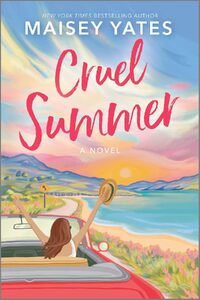Dive into the depths of family drama and environmental crisis with this week's Jen's Jewels! I'm thrilled to introduce you to debut novelist Joselyn Takacs, whose book PEARCE OYSTERS serves up a captivating blend of Louisiana's rich coastal culture and the devastating impact of the 2010 oil spill. Takacs takes us on a journey that's as complex and layered as the oysters her characters harvest, exploring themes of family, community, and ecological responsibility. From her unexpected inspiration to her meticulous research process, Takacs shares fascinating insights into the creation of this timely eco-fiction. Whether you're a fan of Southern literature, environmental narratives, or simply love a good family saga, you won't want to miss this illuminating conversation about a novel that's making waves in the literary world.
Jennifer Vido: What inspired you to write about oyster farmers in Louisiana during the 2010 oil spill?
Joselyn Takacs: Long before I began writing this novel, I was living in Louisiana after college. I was waiting tables at a French Quarter restaurant in 2010 when I heard about an explosion on an oil rig off the coast of Louisiana. That explosion preceded the largest accidental oil spill in world history. We were all gobsmacked by the enormity of the disaster that followed.
That summer, I read a profile in a weekly paper about an oyster farm that was closing down. The oyster farmer explained the threat of the spill from his perspective—one that could put him out of business for years. An oiled oyster reef was not just a season’s loss, but the loss of several years because it can take three years for an oyster to reach market size.
I kept thinking about that profile, even after the oil spill and its effects faded from national headlines. In 2015, I received a grant to record the oral histories of oyster farmers about their lives and how they’d been affected by the oil spill. I interviewed farmers from across Louisiana. They opened their homes to me, invited me for dinner; some invited me out on their boats to see the reefs. On one trip, our boat grounded in the marsh of a Native American burial mound and the captain assured me that we’d be free once the tide came in—four hours later. What those men and women taught me about the ecosystem and the industry—and the oyster—became the foundation of this novel.
Jen: The family dynamics in PEARCE OYSTERS are complex and compelling. Which character did you find the most challenging or rewarding to write?
Joselyn: May was by far the easiest character to write. She’s nervous and people-pleasing and has a bit of sass, though she’s a Southern lady first and foremost, and I found her sections came out like a song. They required the least revision after the fact. Benny’s sections–the bohemian ne’er-do-well–were also fun to write and had some roots in my own experiences in New Orleans back in 2010. Jordan’s sections were the toughest as his experience was furthest from mine, but for that reason, those sections felt hard-won.
Jen: As an eco-fiction novel, how did you balance the environmental themes with the personal stories of your characters?
Joselyn: I’m indebted to my dissertation advisor, Aimee Bender. She let me know from the very beginning when the story felt bogged down with research. I’ll admit I was overwhelmed when I began by the desire to do this story justice, which is kryptonite for creativity. I think that’s partially why I took so long to complete the novel. But the more I wrote, the more certain I was of the novel’s shape and the characters’ arcs.
Jen: You mentioned years of research went into this book. What was the most surprising or interesting thing you learned during that process?
Joselyn: Because I lived in New Orleans at the time of the spill, I remembered some aspects of it vividly—like the bizarre “sensory analysis” used by some trained food inspectors to determine if seafood has been tainted. (They trained for this by taking whiffs of oil.) Later, I was shocked to read that the chemical dispersant used to “clean up” the spill was even more toxic to marine life than we’d believed–52 times more toxic than oil alone according to a study published in Environmental Pollution.
Jen: The Louisiana coastline is such a unique setting. How did you capture the essence of this often overlooked region in your writing?
Joselyn: Research, reading, and trips to the coast. I had the opportunity to go out on boats with a few people in Louisiana, and I peppered them with questions. What kind of bird is that? But also, how do you pass the time on harvest days? I took photos and videos and copious notes while on board. It was a real privilege to be on the water with lifelong fishermen and to listen to their stories.
Jen: I'm curious about your writing process. Do you have any specific routines or rituals that help you get into the creative zone?
Joselyn: Perhaps because I was a young writer when I started, or because the novel’s subject offered up so many opportunities to get my facts wrong, I found that the only way I could make progress on the novel was by freewriting in timed writing sessions. I’ve never been very good at spinning up plot or writing to plan. So after freewriting, I’d return to the text later and see what was interesting there. Writing this way is sort of like panning for gold.
Jen: As a debut novelist, what has been the most unexpected part of your publishing journey so far?
Joselyn: As a debut novelist, it’s a truly delightful shock to meet people–total strangers–who are reading your work. That’s been the best part of getting to travel for book events. Family members are obligated to buy copies, but meeting people who enjoyed the book as non-required reading, that’s as gratifying as I imagined it would be.
Jen: I'd love to know what's on your TBR stack right now. Are there any books you're particularly excited to dive into?
Joselyn: I’m on my book tour at the moment (any writer’s dream), so I wanted good company for my travels. I’m reading Barbarian Days, a memoir about surfing by William Finnegan, and I’m having the best time learning about surf breaks.
Jen: PEARCE OYSTERS touches on themes of family, community, and environmental issues. What do you hope readers take away from the story?
Joselyn: Telling the story of a family allowed me to cover a lot of ground—the commercial fisheries, toxic exposure, climate change, class, race, activism—but I hope that it’s the Pearce family that keeps people turning pages.
Jen: Can you give us a hint about what's next for you? Are you working on another novel or exploring different writing projects?
Joselyn: After spending years on this novel, I needed a break from fiction writing. I’m cowriting my first screenplay with my husband, Taylor Koekkoek. He’s also a fiction writer. (We met in graduate school.)
Jen: Thank you so much for stopping by and sharing insights about PEARCE OYSTERS, Joselyn. It's been a pleasure learning about your debut novel and writing journey. I wish you the very best of luck with your book launch and all your future endeavors in the literary world!
Joselyn: Thanks very much, Jen, for inviting me! It has been a real pleasure.
A fractured family, a devastated community, and the disaster that brings them together.
Pearce Oysters, a lush, evocative, finely-drawn debut novel set on the Louisiana coastline during the historic 2010 oil spill, follows the Pearce family, local oyster farmers whose business, family, and livelihood are all on the brink of collapse.
Eye-opening, eco-fiction at its best, Pearce Oysters highlights the grit and beauty of lives lived in an overlooked corner of the American South and the interdependence of nature and man. Diving deep into the bonds of family, culture, community, class, and industry, blazing new talent Joselyn Takacs elevates the voices of her deeply sympathetic characters: Jordan, the reluctant head of his family’s storied oyster business; May, his distressed, widowed mother who has her own unexpected drama; and Benny, the beatnik musician brother, who returns from New Orleans to help with the crisis.
Inspired by years of her own research, Takacs’s debut novel sparkles as it shines a light on murky waters, old wounds, the power of a family clinging to survival, and their inspiring path forward.
Fiction [Zibby Books, On Sale: June 25, 2024, Hardcover / e-Book, ISBN: 9781958506509 / ]
Joselyn Takacs holds a PhD in Creative Writing and Literature from the University of Southern California and an MFA in Fiction from Johns Hopkins University. Her fiction has appeared in Gulf Coast, Narrative, Tin House online, Harvard Review, The Rumpus, DIAGRAM, Columbia: A Journal of Literature and Art, and elsewhere. She has published interviews and book reviews in the Los Angeles Review of Books and Entropy. She has taught writing at the University of Southern California and Johns Hopkins University.

Jennifer Vido writes sweet romances set in the Lowcountry filled with southern charm and hospitality. In between chapters, she interviews authors for her bi-weekly Jen’s Jewels column on FreshFiction.com. Most mornings, she teaches an arthritis-friendly water exercise class for seniors before heading to the office to serve as the executive director of a legal non-profit. A New Jersey native, she currently lives in Maryland with her husband and two rescue dogs and is the proud parent of two sons who miss her home-cooked meals. To learn more, please visit her website.
No comments posted.


 © 2003-2025 off-the-edge.net
all rights reserved Privacy Policy
© 2003-2025 off-the-edge.net
all rights reserved Privacy Policy